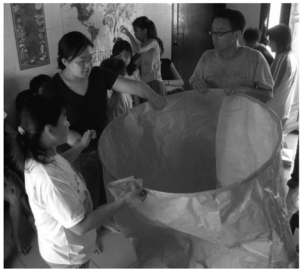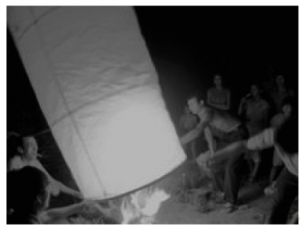My Volunteer Abroad Experience inChina
By Mimi Cheng,CentennialHigh School, August 2005
Graduated from high School and before heading to college, I participated in a workcamp inChinain July through a non-profit organization “Volunteer For Peace” headquartered inVermont. It was one of the most incredible things that I have ever done. I volunteered for two weeks in Xinjing, a farming village in the countryside ofHainanIslandin southernChina.
The village was on the northern end ofHainanIsland, about an hour away from the city ofHaikou. The weather was hot and extremely humid, as one would expect of any tropical island. The landscape was lush and green: palm trees, banana trees, rice paddies. Geckos scaled the walls of our house, beetles and cockroaches crawled on our floors, and butterflies and mosquitoes flew all around. We’d be awakened by the sound of crowing roosters early each morning.
The village consisted of about ninety families, or about four hundred people. It had two small convenience stores for sodas, ice cream, Ramen noodles, cigarettes, and beer. The farmers grew rice for their families to eat and watermelon, squash, winter melon, bitter melon, and green beans to sell at the markets in the city. Some also raised chickens, pigeons, and frogs to be sold and eaten. The villagers would go to a larger neighboring village, Guanan, (usually on motorcycle—all of the farmers had motorcycles) for the farmers’ market, restaurants, Internet café, pool hall, etc. A wide dirt road, bordered by tall grasses and weeds, connected Xinjing and Guanan.
There were six volunteers in all, three guys, three girls: three fromSouth Korea, one from France, one fromBelgium, and one (me!) from theUS. We were all college students, ranging in age from 18 to 24, and we got along wonderfully. We lived in a house set aside especially for volunteers. It was a one-story, traditional Chinese house. There was a sitting room that connected to a bedroom on each side: one for the guys and one for the girls. Mosquito nets were draped over the bunk beds and cool bamboo mats covered the beds. At each end of the sitting room were large wooden doors. These were always kept open, except occasionally in the evenings to keep the roaming dogs and cats from wandering in while we slept. There was no air conditioning or hot water, but we managed to survive the heat with electric fans and the cold showers were actually refreshing considering the weather. The toilets were broken, so they didn’t flush. We took turns washing the dishes, and we learned to conserve water when doing the dishes or showering because the water would often stop and more would have to be pumped from the well. Because of the humidity, we’d be constantly sweating and a little smelly. We’d be lucky if we were only sticky from the sweat and not dripping with it. We lived simply and modestly, but comfortably.
Our camp leader was a woman by the name of Shao Li. She lived in the village and had grown up in the area. She spokeHainan, Mandarin, and broken English. Mr. Gin, a village man in his late 50s, lived in a room connected to our house and cooked for us everyday. Communicating amongst ourselves was an interesting task; conversations often had to go through multiple translations in different languages, bouncing the message back and forth to make sure the meaning was correct. The French and Belgian volunteers spoke French and English. The Koreans spoke Korean and differing levels of English, and one of them could also speak Mandarin. I spoke English and Mandarin as well a bit of French. We usually managed to communicate just fine—we all had some languages in common. I became the translator of the group, translating Chinese to English and vice versa between Shao Li and Mr. Gin, and the other volunteers.
Everyday, we’d wake up around 6:30 or 7:00. After the traditional local breakfast of sweetened black coffee and greasy buns, we’d set off to work with a few of the village men on the dirt road connecting the village to Guanan. Our job was to clear the sides of the road of the tall weeds and grasses using hoes. This way, the sides of the road would be clear and slightly downward sloping so that when it rained, water would slide off of the road, preventing the road from flooding. We’d return home around 11:00. Mr. Gin would have lunch prepared for us, and after a siesta, we’d teach the village children English. We transformed our sitting room into a classroom. The room was divided in two for two classes, one for the younger children and the other for the older children. We taped large pieces of construction paper on the walls for our blackboards. We taught them the alphabet, numbers, colors, animals, the days of the week, body parts, etc., and we created games for them to make the lessons more interesting.
The children in the village were quite something! So spirited and lively, with an endless supply of energy! They were always smiling, laughing, giggling. Day and night, they ran all through the house. They wrestled on the floor, climbed all over the male volunteers, and chased one another in circles. Our house was constantly filled with the sound of the children’s laughter, their yelling, and their playing.
At night, after dinner and after the kids had finally gone home for the day, the six of us would lounge in the sitting room. We’d be exhausted, not so much from the physical labor in the morning as from keeping up with the children the rest of the day. Sometimes we’d bring out snacks that we’d brought from our home countries. There was Belgian chocolate, Korean ginseng chewing gum, and Chinese millet chips. Sometimes the others would buy cheap beer from the little convenience store. A man who lived next door would sometimes wander in. He wouldn’t talk much—it was hard for me to understand his Chinese because of his thick local accent—he’d just sit with us, have a cup of beer, and maybe taste some of the foods that we’d brought out. He’d smoke a cigarette with the two European volunteers, using an empty coconut for an ashtray.
The house would finally be quiet since all of the children had left. We would sit and talk. Long, interesting conversations about everything and anything. We talked about our experiences, our homes, our cultures, and our beliefs. We talked about everything from politics (North Korea-South Korea relations, the religion and beliefs of the American people, the world’s perception of the US), to cuisine (rice for three meals a day in Korea, whether French fries are really French or Belgian, must-try dishes in Spain), to entertainment (music, clubbing, partying), to social customs, to travel, to college and so much more. I learned so much from everyone. They were some of the most fascinating people I had ever met. I enjoyed these late-night conversations immensely.
On the weekends, we had a break from work and teaching. We went to the beach, about half an hour from the village, and toured a nearby city, Wenchang. Two of the farmers in the village also taught us how to make kites and lanterns using just tissue paper, bamboo sticks, glue, plastic string, and a little wire.
A day or two before the camp ended, the village held a farewell celebration for us. It was outside, in the dark of night. Light bulbs hanging on extension cords illuminated a dirt clearing outside our house. They had a television and karaoke machine set up. The children sang for us, and we sang a few American songs for them. We thanked the village for welcoming us, and the village leader thanked us in turn. To conclude the evening, we lit the paper lantern we had made. It was large, five or six feet tall, and it worked like a hot air balloon. We lit the lantern and then released it into the sky. It flew and flew, so high. It flew until it was so small that it looked just like another star, glowing orange in the night sky… So small, until eventually, we couldn’t even see it anymore. It was breathtaking! Beautiful! Stunning! I was in awe.
This experience was absolutely amazing. I cannot express to you the level of… of… satisfaction, happiness I received from volunteering at the workcamp. It was more spectacular than anything I could have ever imagined or hoped for. Our group of volunteers had become so close. We had bonded immediately, and I had such fun with them. I miss them dearly, especially for those precious late-night conversations that we had. I miss the village too. They welcomed us so warmly, and I became accustomed to the lifestyle and the daily routine there. It became my whole world for those two weeks. I hope very much that someday, I will go back to visitXinjingVillage, and that someday, we volunteers will meet again.
Class Time
Building a lantern with paper, bamboo sticks, glue, plastic strings & wire
Lighting & warming the lantern kite





0 评论